close 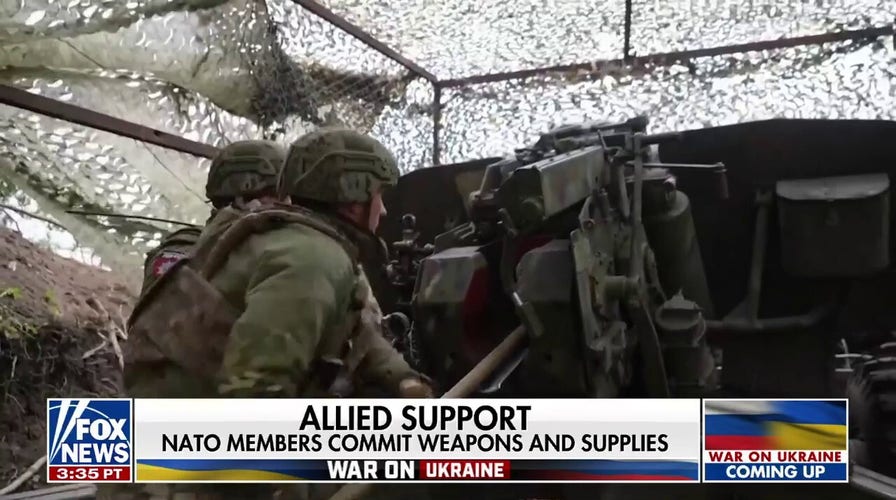
NATO members debate whether to allow Ukraine to use Western weapons on Russian soil
Fox News’ Alex Hogan reports on the debate among NATO members on whether to allow Ukraine to use Western munitions and supplies for strikes on Russian soil.
Join Fox News for access to this content Plus special access to select articles and other premium content with your account – free of charge. By entering your email and pushing continue, you are agreeing to Fox News’ Terms of Use and Privacy Policy, which includes our Notice of Financial Incentive. Please enter a valid email address. By entering your email and pushing continue, you are agreeing to Fox News’ Terms of Use and Privacy Policy, which includes our Notice of Financial Incentive. Having trouble? Click here.
More NATO allies have approved measures to allow Ukraine to use supplied weapons for attacks on military targets in Russia as the U.S. remains a key and increasingly solitary holdout as pressure mounts to authorize use.
“It’s rather unfortunate that with all the atrocities we see in Ukraine, we have not allowed it to use weapons against Russia’s targets,” Lithuanian Foreign Minister Gabrielius Landsbergis told Fox News Digital.
“I don’t have the answer why Russia may heavily shell Kharkiv from Belgorod, but Ukrainians may not strike back,” Landsbergis, who will attend an informal meeting of NATO foreign ministers in Prague this week, argued. “At a certain point, Russia can read our inaction as an invitation. And we are already at that point.”
Biden administration officials have said throughout the conflict that Ukraine may only use U.S.-provided weapons on targets within Ukrainian territory and airspace and actively discouraged any attacks within Russia, but U.S. Secretary of State Antony Blinken indicated on Wednesday that the U.S. is seriously considering if it would allow Ukraine to use American-provided weapons to strike military targets in Russia, citing the evolving tactical situation, according to The Wall Street Journal.
SWEDEN PLEDGES RECORD $1.2B IN MILITARY AID TO UKRAINE, INCLUDING ADVANCED AIR DEFENSE
NATO as a whole urged restraint for much of the conflict, but Russia’s renewed attacks from fortified positions across the border has created a frustrating situation for Ukrainian officials. NATO allies such as Germany and France, and newly-admitted Sweden, have switched positions and have urged the U.S. to follow their example in allowing Ukraine to use weapons more liberally to attack Russian targets across the border, Euronews reported.
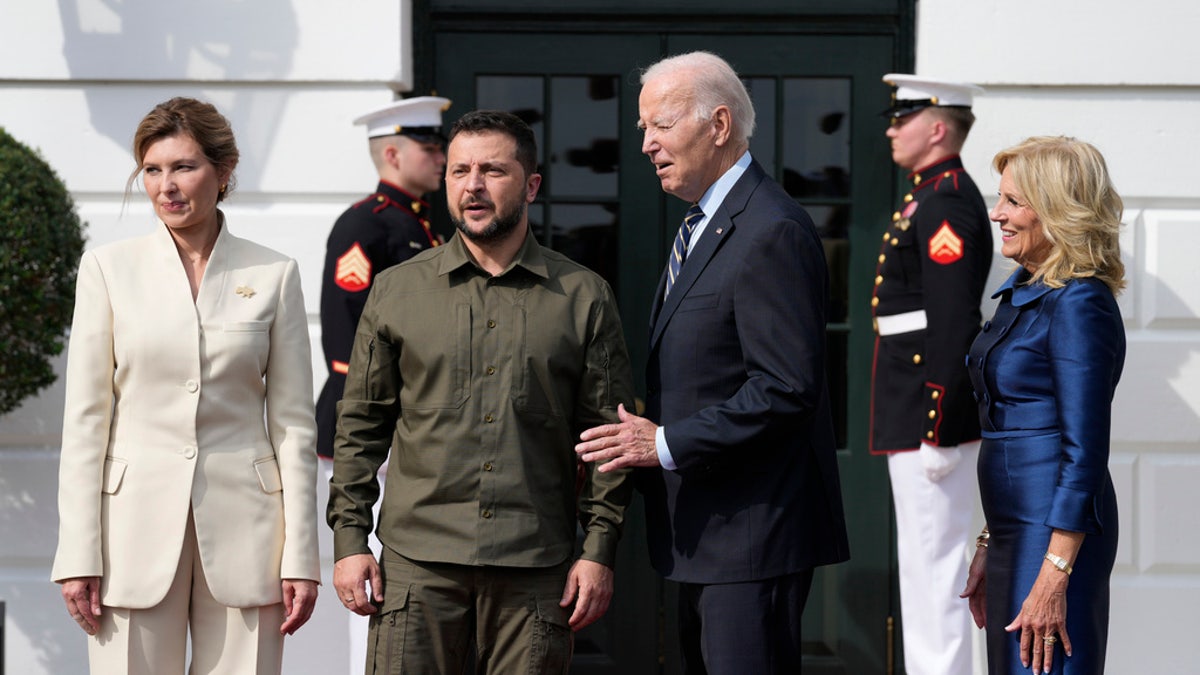
President Biden and first lady Jill Biden welcome Ukrainian President Volodymyr Zelenskyy and his wife Olena Zelenska on the South Lawn of the White House in Washington, D.C., on Sept. 21, 2023. (AP Photo/Susan Walsh)
President Biden has so far maintained that Ukraine should not use the weapons supplied by NATO to strike at Russian military targets across the border over fears that such actions could cause further escalation. Rep. Michael McCaul, R-Texas, Chairman of the House Foreign Affairs Committee, said during a hearing with Secretary of State Antony Blinken last week that the policy was like “tying their hand behind their backs” in Ukraine’s conflict with Russia.
Specifically, the renewed focus on Kharkiv, the second-biggest city in Ukraine, has raised the alarm among Ukrainian officials that Russia may try to take the city and establish another foothold in the country.
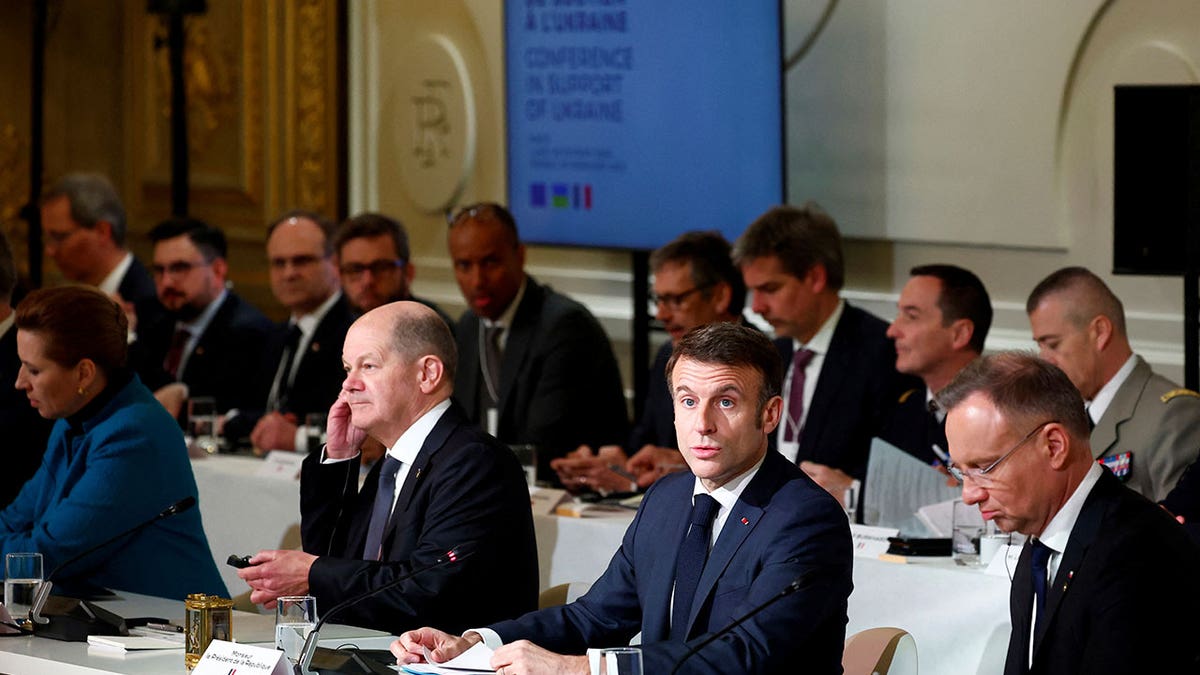
French President Emmanuel Macron, center right, delivers a speech at the Elysee Palace in Paris on Feb. 26. More than 20 European heads of state and government and other Western officials are gathering in a show of unity for Ukraine, signaling to Russia that their support for Kyiv isn’t wavering as the full-scale invasion grinds into a third year. (Gonzalo Fuentes/Pool via AP)
Russian President Vladimir Putin told reporters during his visit to China earlier this month that “what is happening on the Kharkiv front is their own fault,” blaming Ukraine for attacks on Russian villages that forced him to retaliate.
POLAND FOREIGN MINISTER SAYS POSSIBILITY OF SENDING SOLDIERS TO UKRAINE SHOULD NOT BE RULED OUT
French President Emmanuel Macron visited with German Chancellor Olaf Sholz this week, during which the two leaders agreed to remove constraints on Ukraine’s use of NATO weapons on Russian military targets across the border, Euronews reported.
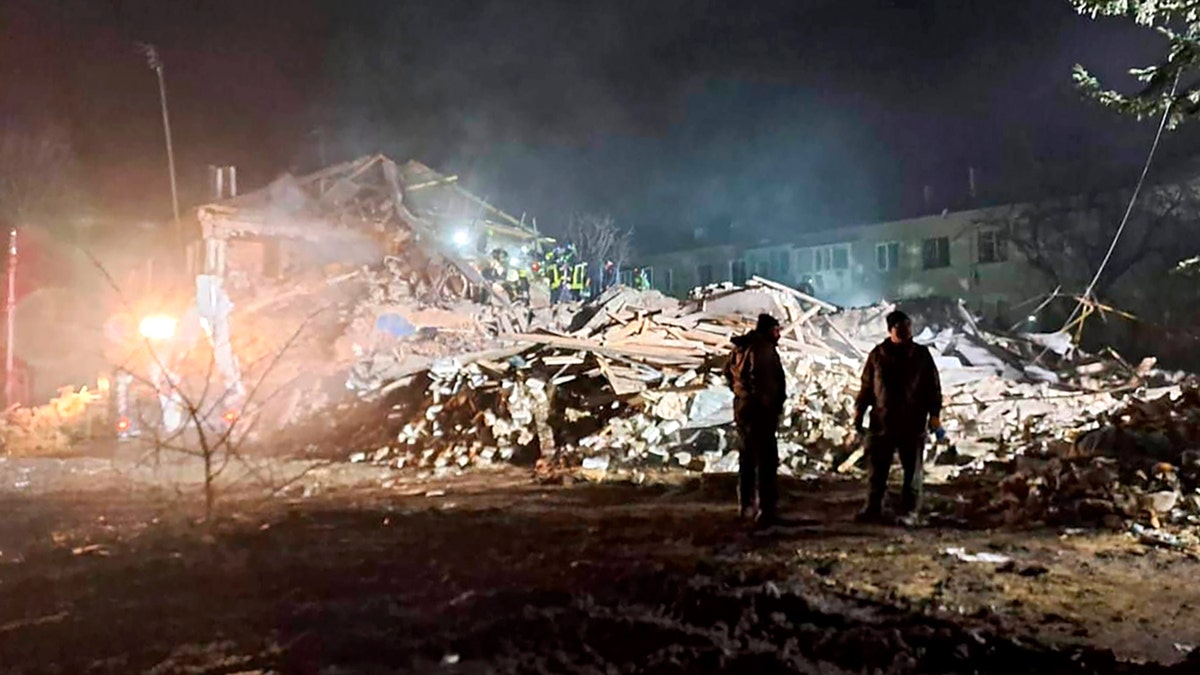
Firefighters survey the scene from Russia’s missile attack on the Kharkiv Region in Ukraine on Feb. 15. (Kharkiv Regional Governor Oleh Sunyiehubov Office/ via AP)
Macron highlighted the most active Russian bases that have attacked Ukraine, showing reporters a map that indicates how many of those bases are safely within Russia and therefore out of Ukraine’s reach while the Russians continue their attacks.
“Ukraine has every opportunity to do so in the framework of international law. We have to say it clearly. It is under attack and it can defend itself,” Scholz said, while Macron stressed the approval would only go so far as military targets and NATO “should not allow” Kyiv to hit anything else.
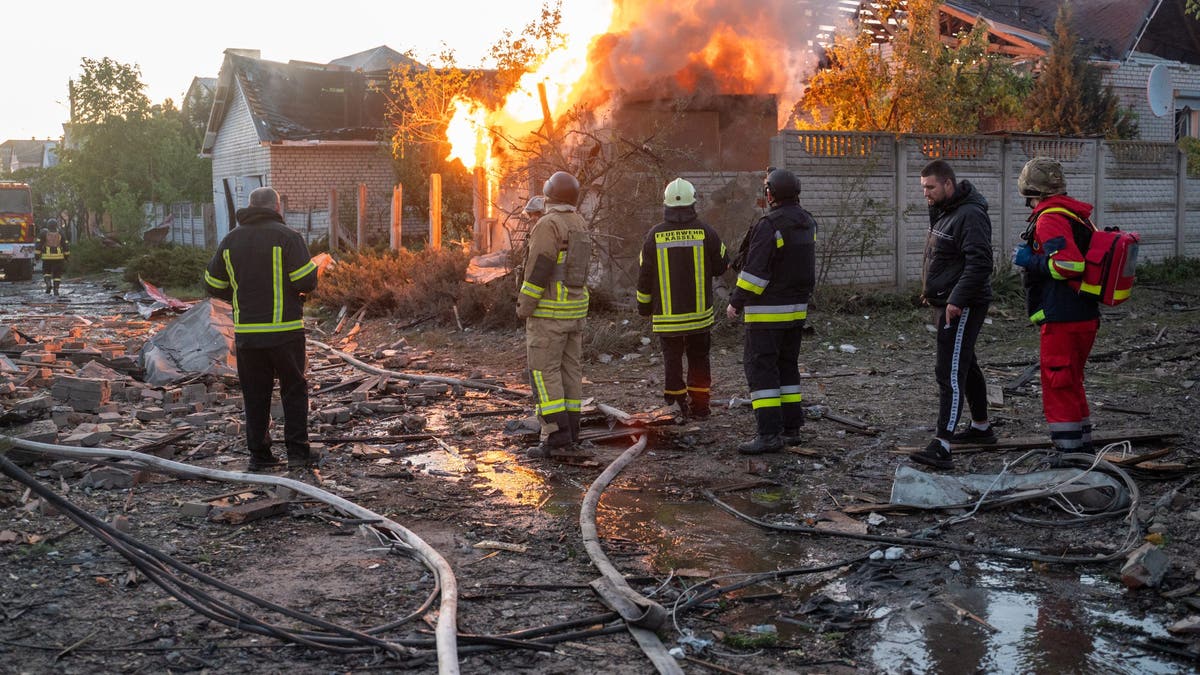
A view from the site aftermath of the explosion of a Russian missile in the area of a cottage residential development in Kharkiv, Ukraine, on May 10. (Stringer/Anadolu via Getty Images)
“There’s no change to our policy at this point. We don’t encourage or enable the use of U.S.-supplied weapons to strike inside Russia,” National Security Council spokesman John Kirby told a briefing on Tuesday.
BIDEN MISSING UPCOMING UKRAINE TALKS WOULD BE ‘APPLAUDED’ BY PUTIN, ZELENSKYY SAYS
Ukrainian President Volodymyr Zelenskyy made a renewed plea this week during a visit to Spain, during which he said that NATO allies must work with Ukraine and “put pressure not only on Russia, but also on our partners to give us the opportunity to defend ourselves against Russia.”
NATO Secretary General Jens Stoltenberg on Monday during a visit to Bulgaria added his voice to the growing chorus of calls for Biden to ease the restrictions on Ukraine’s weapon use, insisting it is a necessary measure to help Ukraine defend itself.
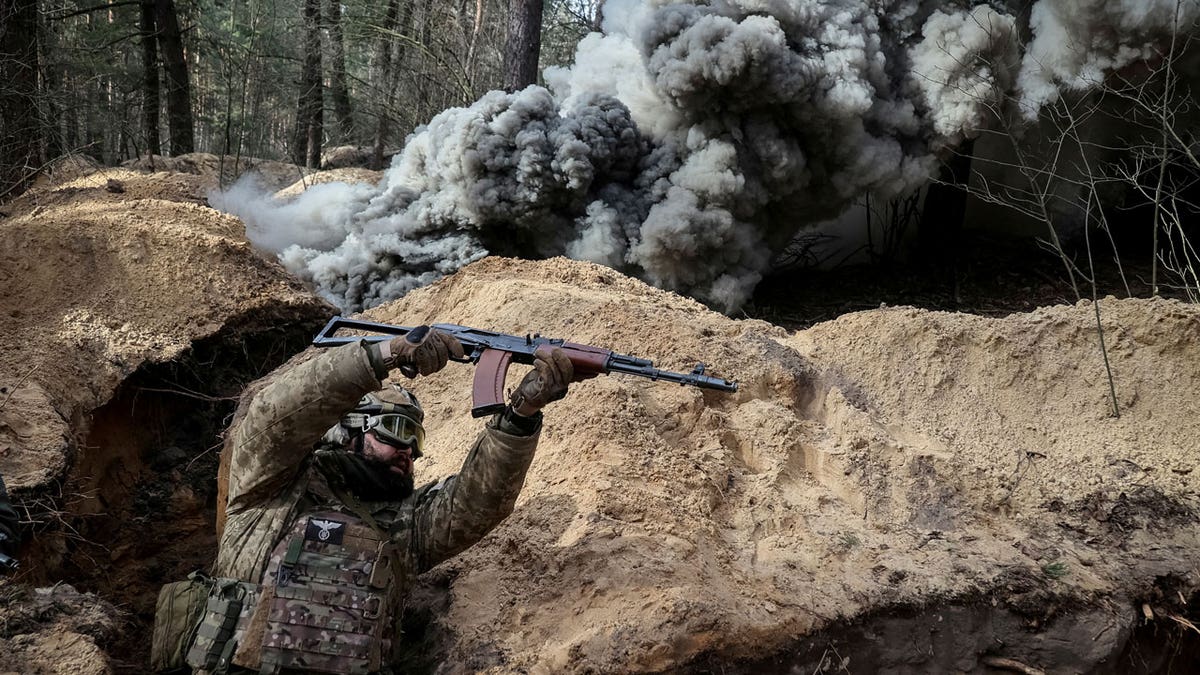
A Ukrainian serviceman of the National Guard takes part in radiation, chemical and biological hazard drills amid Russia’s attack on Ukraine on Feb. 29. (Reuters/Vyacheslav Madiyevskyy/File Photo)
“If you cannot attack the Russian forces on the other side of the front line because they are on the other side of the border, then of course you really reduce the ability of the Ukrainian forces to defend themselves,” Stoltenberg said.
Rebekah Koffler, a strategic military intelligence analyst and author of “Putin’s Playbook,” noted that while Biden’s concern about Putin’s reaction to Ukraine strikes may have merit, the administration is taking a very “risk-averse” approach to Ukraine now, and it will leave the U.S. flatfooted as Russia acts with greater impunity.
“By prohibiting Ukraine to strike Russia proper, President Biden seeks to avoid putting the U.S. homeland and Americans at risk due to a highly likely conflict escalation, which would drag U.S. forces into the war,” Koffler said.
CLICK HERE TO GET THE FOX NEWS APP
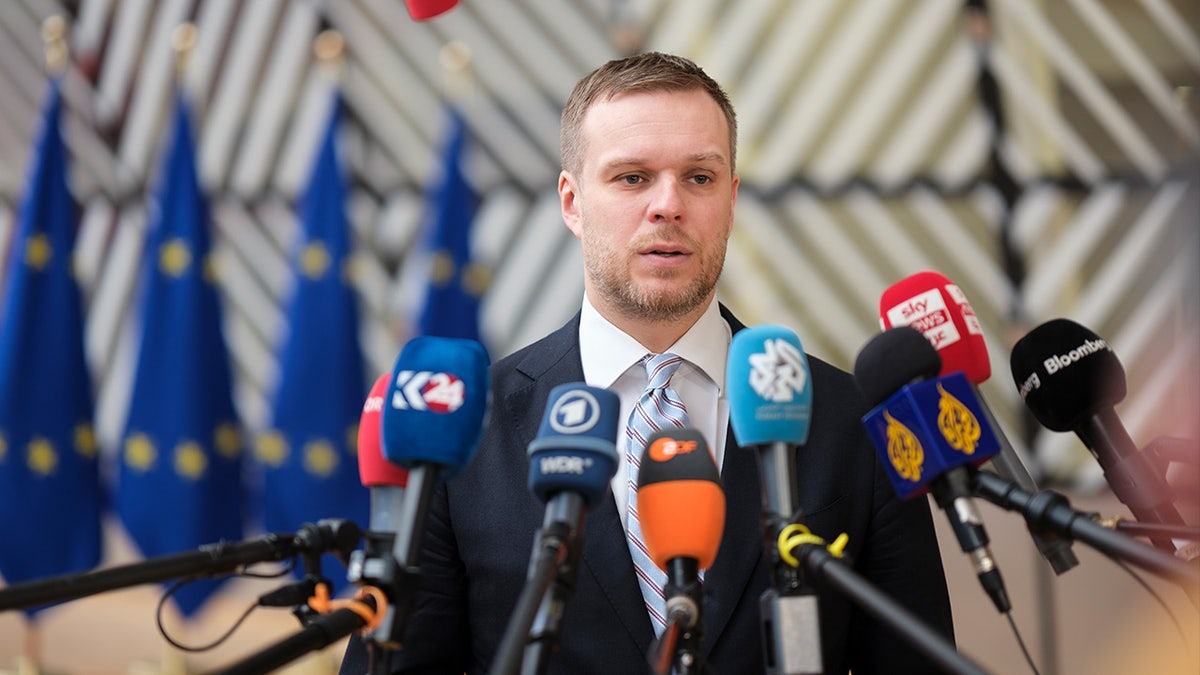
Lithuanian Foreign Minister Gabrielius Landsbergis speaks to reporters in Belgium. (Thierry Monasse/Getty Images)
“If President Biden were to authorize Ukraine’s strikes on Russia proper, using U.S. weapons, Putin would almost certainly retaliate against the United States, both inside U.S. homeland and outside of it, on U.S. interests, facilities and personnel,” Koffler continued.
“Inside the U.S., Russia will highly likely use non-kinetic means, such as cyber, striking U.S. infrastructure, such as water systems, banks, hospitals, transportation,” she added. “Russia has been mapping out access to U.S. critical infrastructure for over two decades and has conducted test runs.”
The White House did not respond to a Fox News Digital request for comment by time of publication.
Peter Aitken is a Fox News Digital reporter with a focus on national and global news.
